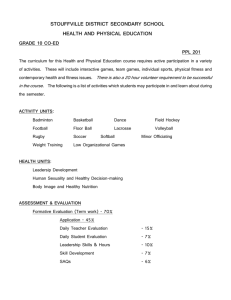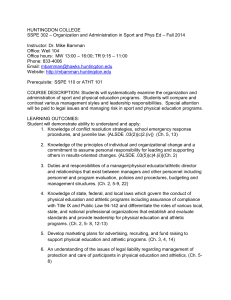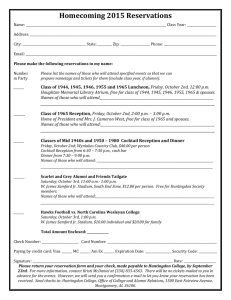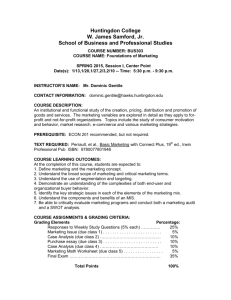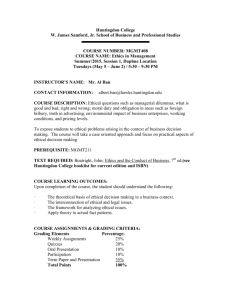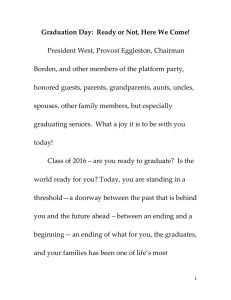Huntingdon College - Dr Bamman`s page to help his students :D
advertisement
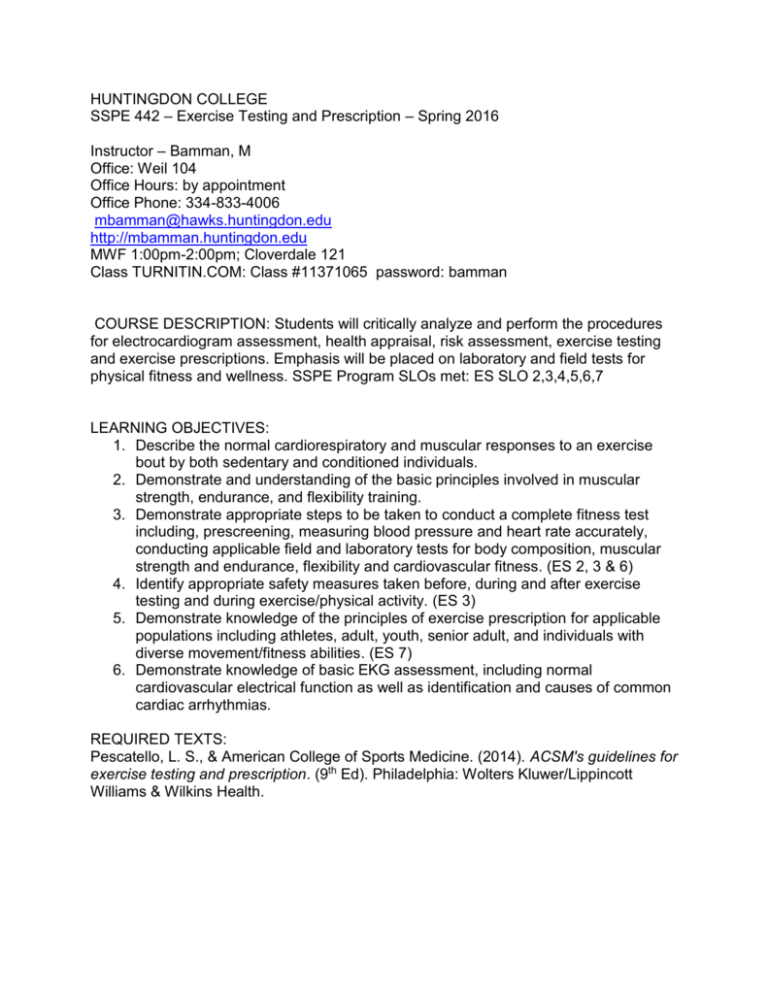
HUNTINGDON COLLEGE SSPE 442 – Exercise Testing and Prescription – Spring 2016 Instructor – Bamman, M Office: Weil 104 Office Hours: by appointment Office Phone: 334-833-4006 mbamman@hawks.huntingdon.edu http://mbamman.huntingdon.edu MWF 1:00pm-2:00pm; Cloverdale 121 Class TURNITIN.COM: Class #11371065 password: bamman COURSE DESCRIPTION: Students will critically analyze and perform the procedures for electrocardiogram assessment, health appraisal, risk assessment, exercise testing and exercise prescriptions. Emphasis will be placed on laboratory and field tests for physical fitness and wellness. SSPE Program SLOs met: ES SLO 2,3,4,5,6,7 LEARNING OBJECTIVES: 1. Describe the normal cardiorespiratory and muscular responses to an exercise bout by both sedentary and conditioned individuals. 2. Demonstrate and understanding of the basic principles involved in muscular strength, endurance, and flexibility training. 3. Demonstrate appropriate steps to be taken to conduct a complete fitness test including, prescreening, measuring blood pressure and heart rate accurately, conducting applicable field and laboratory tests for body composition, muscular strength and endurance, flexibility and cardiovascular fitness. (ES 2, 3 & 6) 4. Identify appropriate safety measures taken before, during and after exercise testing and during exercise/physical activity. (ES 3) 5. Demonstrate knowledge of the principles of exercise prescription for applicable populations including athletes, adult, youth, senior adult, and individuals with diverse movement/fitness abilities. (ES 7) 6. Demonstrate knowledge of basic EKG assessment, including normal cardiovascular electrical function as well as identification and causes of common cardiac arrhythmias. REQUIRED TEXTS: Pescatello, L. S., & American College of Sports Medicine. (2014). ACSM's guidelines for exercise testing and prescription. (9th Ed). Philadelphia: Wolters Kluwer/Lippincott Williams & Wilkins Health. EXPECTED MEASURABLE OUTCOMES Students will: 1. Complete a battery of tests designed to measure knowledge of: (a) health appraisal, (b) risk assessment and exercise safety, (c) exercise testing, (d) exercise prescription and, (e) electrocardiogram (40%). 2. Develop, supervise and instruct classmates regarding multiple health and fitness assessments, including an informative paper on assessment (40%). 3. Complete several assignments and field tests designed to assess students’ current knowledge of assigned materials and complete/submit written homework assignments. (20%). ASSESSMENT: Tests Presentations/Demonstrations/Paper Labs/Field Tests/Homework/Quizzes 400 points 400 points 200 points A = 900 – 1000 points B = 800 – 899 points C = 700 – 799 points D = 600 – 699 points EXAMS & QUIZZES: Each quiz and exam will consist of multiple choice, true/false, matching, short answer, and/or essay questions randomly selected from the material covered. Questions will require the application of information given during lecture, within the text, from assigned readings and/or websites. Quiz material will generally be based on information assigned for the current class period. The final exam will be comprehensive, covering all materials covered in class and in reading assignments. LABORATORY/FIELD TESTS: During the semester, students will administer several laboratory and field tests used to assess various areas of health-related fitness. During the assigned laboratory days, students will be responsible for test explanation, safety considerations, test handouts, test administration, and results interpretation. CLASSROOM POLICIES: Students are expected to be on time for the start of class. If the student is not present when the instructor checks role, then the student will be considered absent for the class. Quizzes missed due to tardiness cannot be made up. Students may not make up assignments, nor submit late assignments, in the case of an unexcused absence. The student will receive a zero (0) for the assignment. No hats, no tobacco, no cell phones. There will be no exceptions to these policies. ATTENDANCE POLICY: Attending all classes at Huntingdon College is mandatory. Students are expected to attend all scheduled classes. CODE OF CLASSROOM CONDUCT: Huntingdon College seeks to nurture wisdom, service, and faith. As a community of learners, we hold one another to a high level of conduct. Learning cannot take place in an environment of disrespect or disorder. In order to facilitate learning and discovery, Huntingdon students and faculty are expected to conduct themselves in a way befitting the 155 year-old tradition of Huntingdon College. What faculty can expect from students: 1. 2. 3. 4. 5. 6. 7. 8. 9. Students are expected to treat their peers and professors with respect. Students shall not interrupt their fellow students or professor. Derogatory or sarcastic comments directed at students or professors are never acceptable. Students shall attend all scheduled classes. Students shall bring all necessary books and other materials to every class. Students shall arrive for class on time. Students shall not leave class early or gather materials together until the class has ended. Students shall not engage in text messaging (receiving or sending) during class or talking on cell phones during class. If students have an emergency and must receive a message or call, they shall alert their professor at the beginning of class and then step out of the class to take the emergency call or message. Students shall refrain from Internet surfing during class. If a faculty member believes that a student is using his or her electronic device in ways unrelated to class, the professor may prohibit the student from bringing his or her computer to class. Students shall not talk with fellow students during class about topics unrelated to the course. Side conversations are distracting to one's colleagues and the professor. Students shall uphold the standards of academic integrity and the Student Honor Code. Failure to adhere to these standards represents a violation of the Huntingdon College Student Code of Classroom Conduct and may result in students being asked to leave the class. Repeated violations that cause disruption to the learning environment may result in additional sanctions, including removal from the course or, in extreme circumstances, dismissal from the College. What students can expect from faculty: 10. 11. 12. 13. 14. 15. 16. 17. 18. Faculty shall treat all students with respect, regardless of differences of opinion or program of study. Faculty shall be well prepared for classes. Faculty shall grade students fairly based on the policies in the syllabus. Faculty shall return graded materials in a timely fashion. Faculty shall provide students with their current grade when asked. Faculty shall keep regular and consistent office hours. Faculty shall keep student information confidential. Faculty shall make every effort to alert students ahead of time if he or she must cancel a class. Faculty shall work with students to make reasonable accommodations to make up work missed as a result of a documented, excused absence. ACCOMMODATION OF STUDENTS WITH DISABILITIES: Faculty at Huntingdon College makes every effort to accommodate unique and special needs of students with respect to speech, hearing, vision, seating, or other possible adaptations. Please notify the Disability Services Intake Coordinator, Ms. Camilla Irvin, as soon as possible of requested accommodations. CENTER FOR WRITING AND CRITICAL THINKING: The Center for Writing and Critical Thinking, located in Jackson 112, provides support at all levels to students working to improve proficiency at skills associated with collegelevel reading, writing, and critical thinking. The Center offers an active interface between student, instructor, assignment, and tutor. Free one-on-one tutoring is available to all Huntingdon students, either by appointment or on a walk-in basis, Monday through Friday from 10:00 a.m. to 4:00 p.m. ACADEMIC INTEGRITY: Lying, cheating, plagiarism, and other instances of academic dishonesty diminish our community of learners. Academic dishonesty will result in failure on the assignment, quiz, or exam and/or referral for possible disciplinary action. Repeated academic dishonesty will result in failing the course and referral for disciplinary action. Month Sun 17 Mon 18 Tue Wed 19 20 Classes Begin Introduction Thu 21 Fri 22 Sat 23 Chapter 1 Jan 2016 Last Day to Drop/Add 24 25 26 Ch 1 cont 31 1 8 2 15 3 9 10 4 16 17 30 5 6 Chapter 3 11 Ch 3 cont Exam 1 – Ch 1-3 29 Chapter 2 Ch 2 cont Ch 3 cont 14 28 Ch 1 cont Ch 2 cont 7 27 12 13 In Service 18 Chapter 4 19 20 Ch 4 cont- Body Composition Lab 1 Last day to withdraw with a “W” Feb 2016 21 22 23 Ch 4 cont – Body Composition Lab 2 28 29 7 1 14 2 8 9 3 16 27 4 5 Mid Term In Service 10 Ch 4 cont – Flexibility Lab 15 26 In Service Ch 4 cont – CR Fitness Lab 2 Ch 4 cont – Muscular Str/End Lab 13 25 Ch 4 cont Ch 4 cont – CR Fitness Lab 1 6 24 11 12 Blood Pressure 17 Test 2 – Ch 4 18 19 Practical Test 1 Paper topics assigned Mar 2016 Blood Pressure Lab 1 Spring Break 27 28 29 Practical test 2 30 31 Practical test 3 1 2 Practical test 4 Last Day for “WP/WF” Apr 2016 3 4 Practical test 5 5 6 Practical test 6 7 8 Paper due In Service 9 Month Sun 10 Mon 11 Tue 12 Chpater 7 Wed 13 Thu 14 Ch 7 cont Fri 15 Sat 16 In Service Fall PreRegistration Begins 17 18 19 Ch 7 cont 24 25 20 21 Ch 7 cont – Ex Rx lab 26 EKG – Ch 8 27 22 23 EKG – Ch 8 28 EKG – Ch 8 29 30 EKG – Ch 8 Last Day of Class 1 2 3 EXAM: SSPE 302 – 2:30 8 9 10 4 5 EXAM: SSPE 499 – 8:30 EXAM: SSPE 442 – 2:30 11 12 6 7 13 14 Graduation!! May 2016 15 16 17 18 19 20 21 22 23 24 25 26 27 28 29 30 31 1 2 3 4

